Argentina election: Voters go to the polls amid deep economic crisis
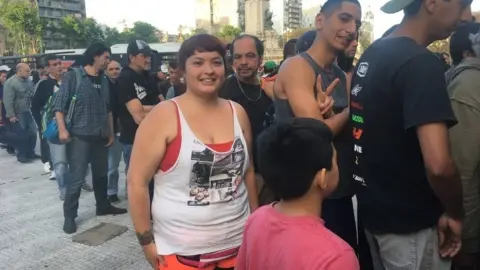 BBC
BBCIn front of Congress a long line of people are queuing up for a portion of mince, beans, potatoes and cheese. There are perhaps 200 men and women waiting in line and each week it gets longer and longer.
Waiting for her plastic container of food and a cup of water is 27-year-old Antonella. She's come with her young son, who has just finished school. This has become routine for the two of them, their chance to get one decent meal a day.
"Before, I had a cleaning job but they let me go," she says. "This is my last resort. For me and lots of people."
Further ahead in the queue is Ariel. He moved from Córdoba to Buenos Aires five years ago to find a job as a kitchen hand, but work is hard to come by. He can just about pay for rent but struggles to find the funds for food.
"What can I say? President Macri has created a country for rich people," he says. "I am going to vote for Cristina. At least she changed things a bit."

Argentina's election in short
- Incumbent President Mauricio Macri, a right-wing businessman, is facing centre-left challenger Alberto Fernández
- Mr Fernández's running mate is former populist President Cristina Fernández de Kirchner (no relation)
- To avoid a run-off, the candidate needs to secure 45% of votes, or 40% and a 10-point lead

A vote for Cristina
Ariel is referring to Cristina Fernández de Kirchner, president of Argentina from 2007 to 2015, who is making a political comeback in these elections.
There's one hitch, though. Ariel can't vote for her because she's not a candidate - she's the running mate to Alberto Fernández (no relation).
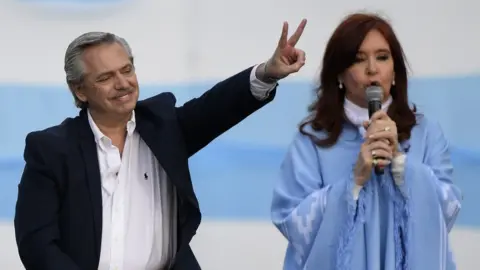 AFP
AFPNot that many voters care. Much of Mr Fernández's success is down to Cristina Fernández de Kirchner. The populist former president is seen as the driving force in the partnership. She's fondly remembered by her supporters as a modern-day Eva Perón, who championed the poor with welfare programmes. But she is a divisive figure, also accused of being corrupt and economically irresponsible.
But with Ms Fernández de Kirchner on the ticket, Mr Fernández is looking the most likely winner on Sunday.
"If this Sunday, 'The Fernández' win the election, which Fernández will be in power?" asks economist Fernando Marengo, reflecting a wider concern that Mr Fernández will be a mere puppet in power.
Politics of economy
Argentina's elections are all about the economy. With nearly one in three people now living in poverty here, Argentines are backing the candidate they think is best-placed to lead the country out of the crisis.
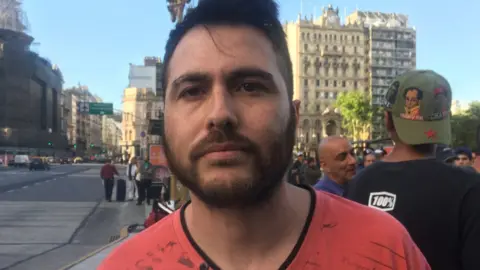
President Macri was a business-friendly face who promised - yet failed - to solve Argentina's economic problems. Those problems many blame on Cristina Fernández de Kirchner and her populist policies of social spending.
Little is known of Alberto Fernández's policies but he says he will play safe with finances. If he wins the elections, he will start having to negotiate with its creditors including the IMF but not everyone believes he will call the shots if populist Cristina Fernández de Kirchner is his second-in-line.
And that, say experts, could spell disaster.
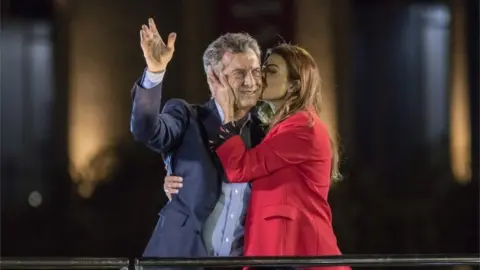 Getty Images
Getty Images"Populism is an easier sell but Argentina is broke," says Benjamin Gedan, the director of the Argentina Project at the Wilson Centre in Washington.
"Opposition voters who expect a return to the easy spending of the Kirchner era will be quickly disillusioned."
Business-friendly Macri
Just north of Buenos Aires is the affluent town of San Isidro. There, I meet Facundo Moro at his shop, Chilly Design. Sipping mate from a traditional cup with a silver straw, he shows me his products - trendy beach chairs and mate carriers. He started the business with friends from university who studied industrial design together. With rising inflation, it's hard to earn a profit, he says.
"I worry about what will happen on Sunday," he says.
"We like a lot of the Macri politics because it's transparent. With Cristina before, everything was more stable but it was fake," he adds, referring to the subsidies that her government handed out generously.
"Politics is difficult in Argentina. You don't know who's telling the truth or lying. We stand by Macri now."
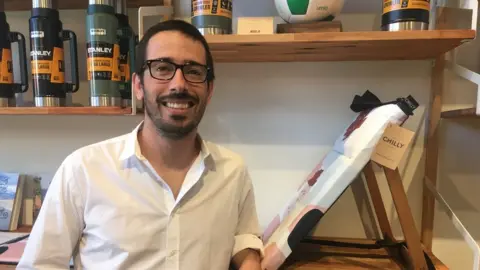
While many Argentines are divided over politics, others just want this all to be over.
"The most important thing is stability," says 61-year-old computer engineer Federico Perez Arrieu. "I've been through all the cycles, dictatorship, everything. What I hope is that at some point we will leave this cycle of stagnation and poverty and that we have the model of country we all want, regardless of party."
Sunday's vote could change the direction of Argentina - and for many, they hope their fate will change too.
